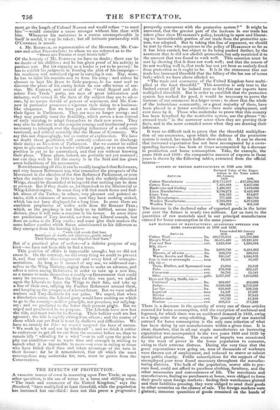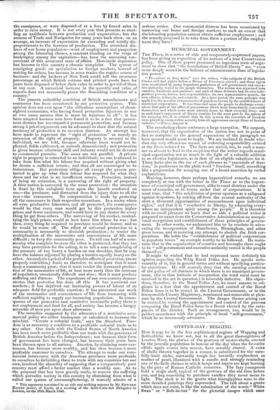THE EFFECTS OF PROTECTION.
A PROLIFIC source of error in reasoning upon Free Trade, as upon other questions, is the use of terms in a loose and shifting sense. o' The trade and commerce of the United Kingdom," says the Standard, "have multiplied at least threefold, while the population has increased but one-third : does not this prove a progressive prosperity concurrent with the protective system " It might be answered, that the greater part of the increase in our trade has taken place since Hostossoses policy, breaking in upon and liberat- ing no inconsiderable portion of our trade from the protective sys- tem, was adopted. But in taking this line of argument, we should be met by those who acquiesce in the policy of ElossissoN so far as it has been carried, but object to its being pushed further, by the averment that he did not abolish protection, but only restricted it to the amount that was found to work well. This assertion must be met by showing that it does not work well ; and that the reason of its not working well is, that trade has not yet been so entirely freed from protection as it ought to be. It is in the statement that our trade has increased threefold that the fallacy of the lax use of terms lurks which we have above alluded to.
"The trade and commerce of the United Kingdom have multi- plied at the least threefold." This assertion is only true to the limited extent (if it be indeed true so far) that our exports have multiplied threefold. But in order to establish that the protective system has worked for good, it would be necessary to prove the increase of our commerce in a larger sense; to show that the whole of the industrious community, or a great majority of them, have been placed in a better condition—have more employment, and earn more by it. Those who undertake to prove that this country has been benefited by the restrictive system, use the phrase "in- creased trade" in the narrower sense when they are proving their facts, and in the more extended sense when they are drawing their inference.
It were no difficult task to prove that the threefold multiplica- tion of our commerce, upon which the defence of the protective system is rested, has much hollow show about it. It can be shown
that increased exportation has not been accompanied by a corre- sponding increase—has been at times accompanied by a decrease in production and home consumption. Take, for example, the years 1838 and 1839: the comparative amount of exports in those years is shown by the following tables, extracted from the official returns—
EXPORTS OF BRITISH MANUFACTURES IN 1838 AIM 1839.
Declared Value of the Expor- tations in the Years ended
ARTICLES.
Cotton Manufactures Cotton Yarn Hardwares and Cutlery Linen Manufactures Linen Yarn Silk Manufactures Woollen Manufactures Woollen Yarn 2
5th January 1839.
£16,715,857 ...
7,431,869 ...
7
1;743098:23272
836,163 ...
777,280 ...
5,795,069 ...
384,535 ... 1840.
£17,694,303 6,857,826 1;42804008 3
814,607 865,768 6,278,099 401,188
The increase in the declared value of exported goods in the latter year over the former is nearly two millions. Let us turn to the quantities of raw materials used in our principal manufactures entered for home consumption in the same years— RAW MATERIALS OF MANUFACTURES: QUANTITIES ENTERED FOR ROME CONSUMPTION IN 1838 and 1839.
Years ended 5th January ARTICLES. 1839. 1840.
Cotton Wool lbs. 460,756,013 355,781,960 Sheep's Wool lbs. 56,415,460 53,221,231 Flax and Tow cwt. 1,625,830 1,228,894
Silk, viz.—
Raw lbs. 3,683,739 3,483,363 Thrown, of all sorts lbs. 243,570 229,941 Waste, Knobs, and Husks lbs. 960,147 1,044,335 Iron in bars or unwrought tons 19,318 18,437 Oil, viz.—
Train, Blubber, and Spermaceti tuns 28,014 22,348 cwt. 276,809 266,427 Cocoa-nut cwt. 38,781 15,541 Olive galls.
Dyes and
nd Dyeing Stuffs, viz.— Cochineal lbs. 2,037,987 202,087
1,8 15,692
492,068 Indigo lbs. 3,020,562
Lac-dye lbs.
2'131799,935:799
Logwood tons
83314,810697
...
Madder cwt. 109,385 ... 97,645 Madder-root cwt. 83,725 ... 81,219 Shumac cwt. 208,251 ... 171,222
There is a decrease in the quantity of every one of these articles entered for home consumption, with the exception of cochineal and logwood, for which there was an accidental demand in 1839, owing to a large order for army-clothing. The quantity of raw material entered for home consumption is the only sure criterion of what has been doing by our manufacturers within a given time. It is clear, therefore, that in all our staple manufactures an increasing exportation was accompanied in the two years 1838 and 1839 by diminished production. The excess of imports was occasioned by the want of power in the home population to consume, owing to their extreme distress. During the very time that the great exportations were going on, tens of thousands of workmen were thrown out of employment, and reduced to starve or subsist upon public charity. Public subscriptions for the support of the unemployed poor were found necessary throughout the manufac- turing districts. The bulk of the population, scarce able to pro- cure food, could not afford to purchase clothing, furniture, and the other necessaries and conveniences of life. The merchants and manufacturers, finding no purchasers at home, were obliged to force their goods upon foreign markets : finding their warehouses glutted and their liabilities pressing, they were obliged to send their goods to other countries on the chance of sale. The foreign markets were glutted; immense quantities of goods remained on the hands of
the consignees, or were disposed of at a loss by forced sales in order to raise money. It is not every year that presents so start- ling an antithesis between production and exportation ; but the returns of Trade and Navigation for many years back show, on an average, an increase of exportation far exceeding and totally dis- proportionate to the increase of production. The attendant dis- tress of our home population—want of employment and pauperism among the labouring classes, a constant treading on the verge of bankruptcy among the capitalists—has been the unceasing con- comitant of this unnatural state of affairs. Mercantile depression has become in this country a chronic complaint. The system of consigning goods on speculation to foreign markets, instead of waiting for orders, has become in some trades the regular course of business : and the brokers of New York could tell the enormous percentage at which British cottons and printed goods have for years been disposed of below their value in order to get rid of them at any cost. A numerical increase in the quantity and value of exports does not necessarily prove the flourishing condition of a country.*
• The present unhealthy condition of British manufactures and commerce has been occasioned by our protective system. This opinion does not rest upon "the ridiculous assumptions of short- sighted economists, who having found protection injurious in one or two cases assume that it must be injurious in all" : it has been adopted because men have found it to be a fact that perma- nent distress has accompanied permanent protection, and because strong a priori arguments can be advanced to show that the natural tendency of protection is to occasion distress. An attempt has been made to represent the " right of protection" as merely an extension of the right of property. Property is secured to the individual, we are told, because otherwise trees would not be planted, fields cultivated, or animals domesticated ; and protection is given because otherwise skill and industry would not be devoted to commercial pursuits. The cases are not parallel. A private right in property is conceded to an individual; no one is allowed to take from him what his labour has acquired without giving what he deems a sufficient return ; and thus all are encouraged to be industrious. But protection obliges all except the person pro- tected to give up what their labour has acquired for what they deem and for what is an insufficient return. Protection, instead of being an extension, is a narrowing of the right of property. A false notion is conveyed by the name protection : the attention is fixed by this eulogistic term upon the benefit conferred on one—the producer, and distracted from the injury done to all the rest—the consumers. No compensation is made by protecting all the consumers in their respective avocations. In a sociey where all were productive labourers, and all protected, the consequence would be that every man would get by this protection higher prices and fewer customers, and would have to pay dearer for every thing he got from others. The narrowing of his market, neutral- izing the high prices, would at best leave him where he was : but then, every thing he required to purchase would be dearer, and so be would be worse off. The effect of universal protection in a community is necessarily to diminish production ; to render the multiplication of the necessaries and conveniences of life snore difficult ; to keep the community poor. To tell one half of a com- munity who complain because the other is protected, that they too may have protection for the asking, is to tell a man complaining of the pressure of too heavy a burden on one shoulder, that he may • have the balance adjusted by placing a burden equally heavy on the other. An analysis a priori of the probable effects of protection, (more properly restriction,) leads us therefore to anticipate that it must keep a community poor; that it must render the increased produc- tion of the necessaries of life, at best more tardy than the increase of population, unnaturally difficult and slow; that it must produce suffering and distress. The experience of our own country demon- strates that protection has done all this. It has narrowed our markets ; it has deprived our increasing powers of labour of an adequate field for profitable exertion; it has prevented our stock of the necessaries and conveniences of life from increasing with sufficient rapidity to supply our increasing population. In conse- quence of our protective and restrictive mercantile policy there is not employment and food for all, and society has become a hungry scramble of men put upon short allowance. The remedies suggested by the advocates of a restrictive com- mercial policy are either inadequate or calculated to increase the mischief. "Create a colonial trade," says the Standard. Free- dom is as necessary a condition to a profitable colonial trade as to any other. Our trade with the United States of North America has been much more profitable than our trade with the provinces of British America before the Independence not because their form of government has been changed, but because their ports have been thrown open to all nations. America, by obtaining more cus- tomers, has become more wealthy, and has thus become a more profitable customer to ourselves. The attempt to make our com- mercial intercourse with the American provinces more profitable to ourselves by forbidding them to trade with any countries but our own, involved the absurdity of supposing that a comparatively poor country must afford a better market than a wealthy one. As to the proposal that has been gravely made, to remove the suffering which pervades society in this country by abstaining from what is called our system of overmanufacturing, it scarcely admits of a • This argument was stated in an able and striking manner by Mr. EDWARD Rearms junior, of Leeds, at a meeting of the Anti-Corn-law Delegates in London, on the 26th March 1840.
serious notice. Our commercial distress has been occasioned by narrowing our home and foreign markets to such an extent that the labouring population cannot obtain sufficient employment ; and the remedy proposed is to take from them a portion of the employ- ment they have!



























 Previous page
Previous page